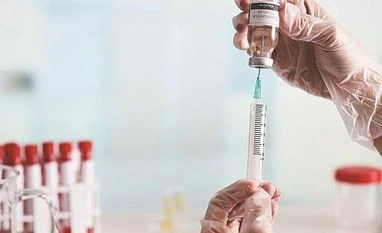India could soon find itself on the horns, let’s make that needles, of a dilemma as it sets out to buy the millions of syringes it will need for the coronavirus vaccine.
More than half the auto disposable syringes bought by the government — 300 million syringes per annum — for mass immunisation programmes for other diseases are imported from China because they are inexpensive.
For the rest, Indian firms are forced to match the low price but many of them fail to pick up the orders, which then go back to the lowest bidder.
These syringes, which ensure single use in a developing country like India, will now also be required in hundreds of millions for the impending mass vaccination for Covid-19. But with relations between the two countries abysmal and restrictions on imports from China, it’s not known how India will get what it needs from a hostile neighbour.
Could this lead to an opportunity for Indian players? Delhi-based Hindustan Syringes and Medical Devices (HMD), one of the largest manufacturers of the product in the world which produces 90 per cent of India’s auto disable syringes, is not at all sure. It has taken a leap of faith by increasing its capacity to 1 billion pieces per year but has avoided battling on price with the Chinese, as that has been the only criterion for the government.
Currently HMD, which manufactures under the Dispovan and Kojak brands, has seven plants churning out over 700 million syringes per annum. It has preferred to export to the global market rather than lose money by selling below costs at home.
Recently, it received firm orders from UNICEF for 140 million syringes this year. The UN agency is stockpiling capacity to ensure that the infrastructure for vaccination is available for developing countries once the vaccines are out.
This UNICEF order, combined with other orders from the organisation for syringes for other global programmes, accounts for nearly half of the company’s total capacity. HMD is also in talks with GAVI, the global vaccine alliance.
Yet, HMD has received no commitment from the government on lifting its syringes for coronavirus vaccination. Contrast this with countries like the US, which placed an order for 190 million syringes from manufacturers, or Canada, which ordered 75 million syringes. The UK government, too, has ordered 65 million syringes from Becton Dickinson.
“We are nervous because in the past, we have geared up our production only to find that the government has preferred to buy from China at L1 rates which are unremunerative and below our costs, with no weightage given to quality. With the Chinese getting 50-65 per cent of the business, we have had to move to international buyers,” said Rajiv Nath, managing director of HMD.
Nath added no matter how low he priced the syringes, Chinese players would knock another 10 per cent off from their price. It’s true that India has tightened import rules for China, especially for government procurements. These rules include mandatory registration.
But Nath said the rules still leave enough loopholes and, in any case, there is no ban on the import of Chinese syringes. Chinese firms generally work through local distributors who import the products and might also do some value addition.
According to Nath, assuming 70 per cent of the Indian population needs to be vaccinated, over 1.800 billion syringes will be required for a period of 18 months to two years. Similarly, globally, five billion people will have to be vaccinated.
If the government were to be interested in avoiding Chinese syringes, Nath said his company was ready to take up the challenge. “If the government needs 100 million auto disable syringes for Covid-19 vaccines by the end of the year, we can easily offer them to lift the outstanding orders placed with us.
“We have 50 million in stock that the government has not lifted because standard immunisation programmes were suspended during the pandemic. And though some have re-started, the pace is very slow,” Nath added.
Unlock 30+ premium stories daily hand-picked by our editors, across devices on browser and app.
Pick your 5 favourite companies, get a daily email with all news updates on them.
Full access to our intuitive epaper - clip, save, share articles from any device; newspaper archives from 2006.
Preferential invites to Business Standard events.
Curated newsletters on markets, personal finance, policy & politics, start-ups, technology, and more.
)